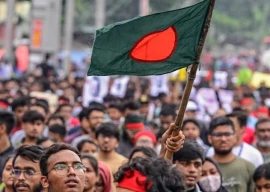
Bomb blasts struck three churches in the northern Kaduna state in the space of an hour, the latest in a string of Sunday attacks that has threatened to ignite wider sectarian strife across the divided country.
There was no immediate claim of responsibility for the bloodshed but the attacks were likely to be blamed on Boko Haram, an extremist group bent on creating an Islamic state and responsible for scores of recent bombings.
Officials put the state -- which last year saw sectarian violence that left more than 600 people dead -- under curfew for 24 hours "to assess the situation", banning Kaduna's seven million inhabitants from leaving their homes for a full day.
Suicide bombers attacked two churches in the city of Zaria and one in Kaduna City, killing at least 16 people, national police spokesman Frank Mba said in a statement.
After news of the blasts spread, Christian youths took to the main motorway that leads to the capital Abuja, attacking motorists who looked Muslim.
Christian mobs carrying machetes and clubs were also prowling the streets of Kaduna city, the Red Cross said.
"Aid workers accompanied by armed policemen have been combing the streets in the southern parts of the city picking dead bodies from reprisal attacks. So far we have recovered over 20 bodies," said a Red Cross official who requested anonymity.
Most were "burned to death beyond recognition," he added. An AFP reporter said he saw the bodies of 10 people killed by rioters at a morgue.
More than 100 people were injured in the day of violence, according to the National Emergency Management Agency.
The first blast struck ECWA Goodnews Church in the Wusasa area of Zaria city at 8:35 am. The second explosion went off 10 minutes later at the Christ the King Catholic church in Zaria's Sabongari area, a police statement said.
The third blast hit the Shalom Church in Kaduna city at 9:30, where a worshipper said he saw a bomber drive an explosives packed car into the church building.
"Right away the car exploded and killed a soldier and two private security guards guarding the church," Joseph Emmanuel told AFP.
Emergency officials had also reported attacks on churches in Nassarawa and Barnawa in the south of the same state but police did not confirm them and the targets of the blasts remained unclear.
The violent response by Christian youth mobs that followed the attacks was termed "a momentary breakdown of law and order," in the police statement.
The police chief urged "criminal elements who have been carrying out campaigns of violence on innocent Nigerians and institutions to desist forthwith," in the statement issued from Abuja.
He also said a massive deployment of forces had been ordered across "every nook and cranny of the state."
One Kaduna resident said it was not safe to travel.
"I cancelled my trip to Abuja because of the huge number of rioters that have taken over the roads," the man told AFP.
The latest violence targeting Christians in Nigeria, Africa's most populous nation and top oil producer, was also condemned by the Vatican.
"The systematic character (of the attacks) on Sundays is horrible and unacceptable," and reveals "an absurd plan of hate" by extremist groups in northern Nigeria, Vatican spokesman Federico Lombardi told journalists.
Brutal sectarian violence gripped Kaduna state following elections last year, during which President Goodluck Jonathan, a southern Christian, won a fresh four-year term.
At least 180 were killed in Kaduna city and Zaria, while more than 500 people were slaughtered across several towns in the mainly Christian southern part of the state, according to Human Rights Watch. Most of the dead were Muslims.
The latest church blasts resembled those previously claimed by Boko Haram, responsible for more than 1,000 deaths since mid-2009.
The militant group has already this month claimed two attacks that struck churches during Sunday prayers, including a suicide blast in Bauchi state that left at least 15 dead.
Nigeria's population of 160 million is roughly divided between a mainly-Muslim north and predominantly Christian south.
COMMENTS (9)
Comments are moderated and generally will be posted if they are on-topic and not abusive.
For more information, please see our Comments FAQ








1730884134-0/BeFunky-collage-(26)1730884134-0-270x192.webp)








This is just too much. If Christians start reacting, it is humanly understandable, at least we've been patient enough. But I think the best thing for Nigeria is to be separated; muslims to their north and christians to the south just has the former Libyan president once said. I also want christians everywhere to pray that YAHWEH will defend HIS name.
Nigeria too has it's own local Taliban type extremists in Boko Haram, who know how to incite sectarianism to impose their irreligious ideological tyranny. Salafist terrorism cancer is spreading everywhere, making it a crisis, like it does for Pakistan and elsewhere.
Its quite unfortunate.. This is a clear message dat d coming of jesus is at hand. ACCEPT JESUS NOW. May d souls of d victims rest in peace.
Its about OIL. It happened in Sudan and it can happen in Nigeria, religion is the excuse to facilitate the break up.
Aftershocks of "war on terror".
Nigerians should learn from India and Pakistan.The situation is rapidly deteriorating into a partition like situation of the Indian sub-continent.Instead of separating and spending millions on maintaining armies and keeping the majority hungry,Nigerians should wise up.This is so tragic for Africa, already ravaged by poverty,disease,hunger and war.
Why is it that North always attacks South in Africa? Is it because Arabian peninsula is to the North of Africa?
Somewhat like Pakistan, I must say!